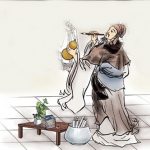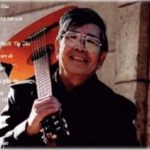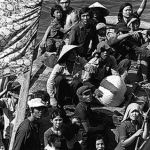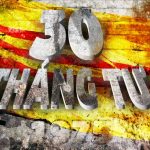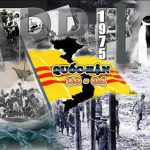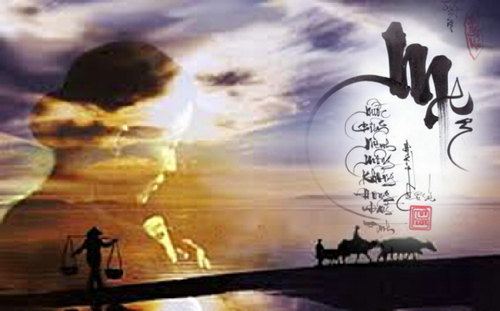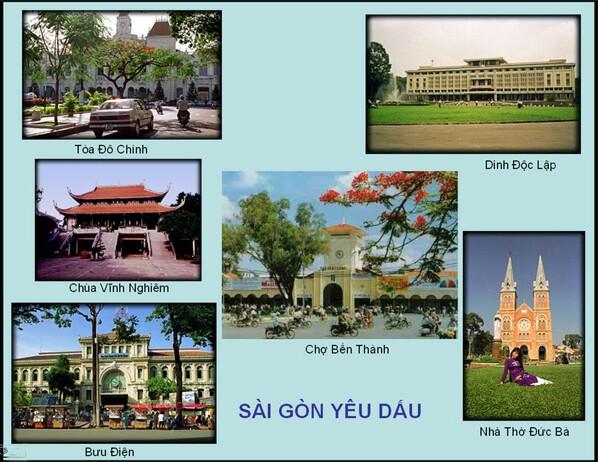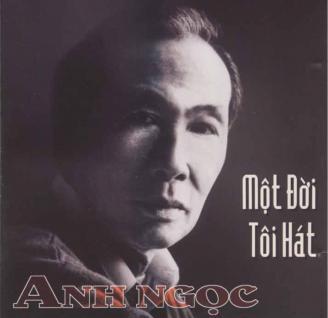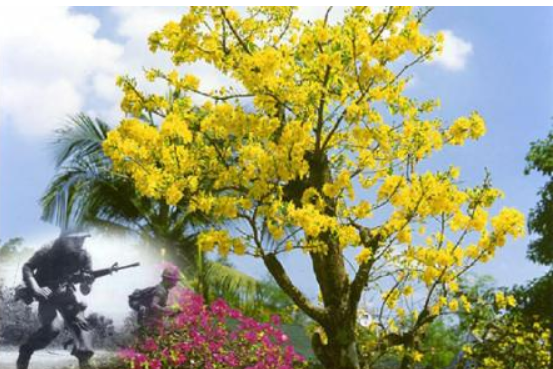Dedicated to my mother and a gift to my siblings, my children and my mother’s grandchildren
My mother’s Memorial Day is approaching; I suddenly miss her so much, like a three-year-old son.
I have heard people say that no matter how old you become, thoughts of your mother will always take you back to your childhood. I am now over the age of seventy and I still find this statement to be very true as I reminisce about my mother.
My mother was an extraordinary Vietnamese woman who lived through the painful historical experiences of the war-torn country during the first 80 years of the 20th century.
She ignored her own suffering and always sacrificed herself for her family.
She had an incredible energy that allowed her to overcome difficulties in life as she traveled from north to south Việt Nam, across the seas, and throughout her time in America.
Her Life in North Việt Nam
My mother was born in 1904 in Thạch Đồng, a small village on the west bank of the Đà river in North Việt Nam.
At that time, the majority of women in Việt Nam were not allowed to go to school.
Under French domination, the old written language that used Chinese characters was phasing out.
She was extraordinarily fortunate to have the opportunity to learn both the old and the new Vietnamese written language that uses the Latin Alphabets.
She also picked up a few French words from her teacher who was the Catholic Father in the nearby village.
Each morning, she crossed the river by boat to attend an old written language class taught by Mr. Trừu.
My mom was his favorite student, so much that when she turned 17-years-old, he asked her to marry his eldest son, who eventually became my father and thus, Mr. Trừu was my grandfather.
Mom’s father was a business man, but adored academia.
I still remember all the times my mother took me to visit him.
I loved when we would all gather in his living room and listen to him read stories to us.
– When she was fifteen, her father wanted her to stop going to school and to learn about business practices.
She joined other women to go upstream on the Đa river by boat to sell clothing, salt and other products that the people in the highlands needed at their markets.
On the way back, she would buy special merchandise from the area, such as honey and mushrooms, to sell in the village markets.
Each of these boat trips could take a few days or be as long as a week on the boat.
The women merchants would take turns to cook and clean for the group.
However, Mom was excused from those tasks. Instead, as the only one who could read, her contribution was to entertain the whole group by reading stories for them to listen to.
Because of this duty, Mom had eventually memorized a number of famous books in Vietnamese literature such as Kiều, Cung Oán Ngâm Khúc, Nhị Độ Mai, Thủy Hử, Lục Vân Tiên, etc.
I remember studying Kiều in high school.
Whenever I read a verse from the book, Mom would always know exactly which part of the story I was at.
She could even recite an entire chapter to me and would help me analyze and understand the story better than my teachers could.
I am grateful for those precious moments with Mom that allow me to still remember and appreciate the stories today.
Deeply influenced by her father-in-law’s teachings, my mother always prioritized the education of her children.
For many years, we lived in very poor conditions and were constantly running away from the war, but even then, she emphasized the importance of our schooling.
All of her actions served the purpose of getting us back into school.
My mom loved literature and was fortunate enough to have inherited business savvy traits from her father.
She revered her father-in-law, her former teacher, like a saint and always followed his advice.
However, there was one thing she kept from him. She never told him that she sent my eldest brother to Hà Nội to go to a French school.
With the times changing, the old Vietnamese education would become outdated and could hinder his future success.
She did not want her son to suffer like her husband.
When she married my father, she became an assistant for her father-in-law, who was not only a teacher, but was also practicing as an oriental medicine man.
Through this role, the sweet young student gained useful business experience.
Her knowledge of the old Vietnamese written language enabled her to fill the prescriptions he prepared for his patients, just like the job of a pharmacist 3 nowadays.
She knew the names and the pharmaceutical values of the oriental medicine products very well and would often explain them to me whenever we were at an oriental drug store.
With her business background, she helped my grandpa grow his business by using his prescriptions to create herbal Asian remedies to help cure common illnesses.
After my grandfather’s passing, my parents extended the business to farming and raising caterpillars for silk production.
While my father lacked modern education, he was very good with handling technical matters.
This allowed my mom to concentrate on the marketing of the products in Sơn Tây area.
The business boomed and they became rich. They built the biggest house in the district, became land owners, and employed many workers.
Unfortunately, the good times did not last long.
The war against the French domination became more and more fierce.
Life in the village became very turbulent. At night, the Việt Minh would routinely come and gather everyone to listen to propaganda against the French army.
The Việt Minh would exercise their dominance by destroying perfectly good buildings, roads and bridges.
During the day, the French and the National government forces would come and search for Việt Minh and anyone they suspected who might have supported the Việt Minh.
Mom was in tears when Việt Minh forces commandeered their home as a temporary headquarter. My dad did not believe in Việt Minh’s propaganda and hated hearing it every night. He silently opposed them and did not cooperate with them. He leaned towards Quốc Dân Đảng party, another national revolution party against the French.
This was likely because Việt Minh had murdered some of his cousins for being members of the Quốc Dân Đảng party.
He strongly believed Việt Minh was simply a communist party in disguise with a strong connection to the Chinese Communists.
One morning, the French attacked our village and Mom guided us to run away into the jungle.
My dad stayed back to watch over the house, but he was shot dead by the French.
He was buried in a hurry by his friends, right at the farmland where he was shot.
Mom had to wait for about 2 years later for a brief opportunity to rebury him in one of the family lots, since the war was still very deadly.
His grave is still there now. I was only about 3-years-old when my father was killed. I can’t remember my father’s face and there were no pictures of him left behind.
My mom particularly favored me since I was the youngest in the family and she often told me that I looked just like Dad.
That is all I know about my father’s face.
After my dad was killed, our big house was seized by the French and modified to become the French headquarters for the region.
Mom took us from one village to another to try to escape from the war zone.
About two months later, Mom gave birth to my little sister but due to the extremely poor living conditions, my sister died after about two months.
Looking back, I can’t believe how we actually survived.
We were basically homeless, trying to evade the war, often living in the woods among insects and adverse weather.
The death of my baby sister was another big shock of trauma for my mother.
Regardless of being exhausted and devastated, she did not quit.
Instead, she used all her energy and her love to take care of me and my siblings.
She was self-sufficient by the age of fifteen. Mom was proud of her work and her business success.
The presence of Việt Minh threatened her daily life and made her life miserable.
She had to always be cautious in fear of someone reporting her activities to the Việt Minh.
The more the Việt Minh praised Hồ Chí Minh like some sort of savior, the more she hated him.
To her, Hồ Chí Minh was a bad guy, a big liar that caused more problems for her family. She did not know anything about politics nor did she care about Karl Marx, Lenin, Communism nor Capitalism.
She strongly believed that one should work to earn their life, honestly and fairly, without stealing and killing.
She kept quiet but was determined to leave the region controlled by Việt Minh at the first opportunity so that her children could go back to school.
Living in the countryside controlled by Việt Minh drained her savings within a couple years.
She was completely broke, we lived in the poorest of conditions, and did not have schooling.
That was her biggest disappointment.
She had lost everything. All she had then were her young, innocent children and she was determined to do everything to get them out of that situation.
– Early one morning in 1949, Mom snuck my brothers and me through several villages, avoiding check points in the Việt Minh controlled area, and escaped to Sơn Tây, the area controlled by the nationalist government under the French.
My mother had secretly planned this trip after getting in contact with her sister who lived in Sơn Tây.
She started working immediately as a merchant to support us.
We still lived very poorly, but she was more at peace and we could go back to school.
Our life was a struggle, but Mom still stood strong.
One day, she returned home frazzled and looked very exhausted.
The government soldiers were ambushed by the Việt Minh’s troops at the market where Mom and other merchants were 5 doing business.
They had to drop everything to run for their lives.
That night, she just cried hysterically.
I was so scared and did not know how to calm her down, but just held her and cried with her.
The next morning, she woke up and continued with her work as usual.
She persuaded my eldest brother, to leave his job in Bắc Giang, which was under Việt Minh control, to bring his family to Sơn Tây so that his children could have better future.
During this time, Việt Minh was becoming more and more of a real communist party with the land revolution that advocated hatred between the peasants and the landlords in the country, just like Mao’s movement in China.
Towards the end of 1950, he and his family escaped to Sơn Tây and was reunited with Mom.
He was unemployed for about 6 months, but finally got a job in the agriculture department and moved to Huế to work.
By 1953, the war in Việt Nam was fierce with the Điện Biên Phủ battle between the French and the Việt Minh. Việt Minh had formulated a true communist identity with full support from the Chinese.
Although the Việt Nam war was portrayed as a conflict between Western forces and the Vietnamese people, the war was really a feud between the free world and the international Communist bloc.
The French were losing ground and tried to negotiate an agreement to withdraw from Việt Nam.
In 1954, many countries assembled for the Geneva Conference in Switzerland to develop a peace agreement.
The Geneva Accords divided Việt Nam into two states at parallel 17 degrees north.
Life in the country under Việt Minh control was rife with turmoil.
The Land Revolution, which mimicked the Land Reform movement in China, was in full force.
Many landowners, even those with only a few acres, were sentenced to death by the communist courts. Many of those landowners had been supporting the peasants for generations, but hatred and revenge were encouraged and promulgated by the communist party everywhere.
The situation continued to get worse. Talk about the war front and the Geneva Accords circulated around town.
My mom was worried and desperate. Former neighbors and relatives from our village came to visit and tried to persuade her to return to the village.
She just listened to their propaganda and showed no objection.
She began selling most of our belongings, told people around that she was getting ready to return home in the village, and everyone seemed to believe her.
However, early one morning, without saying goodbye to anybody, she quietly gathered all of us with our crucial belongings to the bus station and bought tickets to go to Hà Nội.
After that, we went to Hải Phòng, took a ship to Đà Nẵng, and finally to Huế to be with my eldest brother and his family.
I had no idea that she secretly planned the trip for us to escape from the communists.
The trip was executed and completed just a few days before the deadline of July 20, 1954 when there would be no traffic allowed between the two parts of Việt Nam- per the Geneva Accords.
– Thinking back, I am truly amazed by her perseverance and quick decision making to escape from the communist regime.
Up until this point, Mom had only been to Hà Nội once or twice and had never been to Hải Phòng.
It was the first time she left her beloved village where she had so many memories.
She left her house and land, including my father’s grave in North Việt Nam.
It was a very painful, but courageous decision. She had no idea of what to expect of life in central Việt Nam. While she lacked political knowledge, her real-life experiences and love for her children let her reason through what needed to be done.
I strongly believed that her concern for our future and the agonizing experiences she endured under the control of Việt Minh fueled her determination.
Life in Huế, Central of Việt Nam
Mom was ecstatic to reunite with my eldest brother’s family, especially her three grandchildren. My eldest brother was very busy working for the agriculture department in Huế.
After about 6 months of living with my brother’s family, Mom decided to move us out to avoid overburdening his family.
Even though my brother tried to stop her, Mom maintained her resolve and wanted to be more independent. She started a simple business as a street merchant selling the North Vietnamese style noodle soup.
While she typically sold to other Northern refugees like us who were homesick and happily welcomed her food, local Huế people were also interested in trying her soup as an alternative for their traditional Bún Bò Huế.
Mom found difficulty adapting to the local customs of Huế.
In particular, women wore long dresses anytime they left the home, even if they were working, or carrying food around to sell on the street.
In the market, merchants wore long black dresses.
Mom was accustomed to the women of northern Việt Nam who only wore long dresses if they worked in corporate offices, to partake in 7 celebrations, to attend church, or to visit a pagoda; black was also perceived a somber color, typically reserved for funerals.
While it made her uncomfortable, she eventually conformed to wearing the long dresses for ease of mingling with customers when selling food.
Our family got acquainted and settled down in Huế and Mom was finally happy when the kids were able to go back to school.
Unfortunately, I became very ill and something was wrong with my spine.
After a few months of treatments in the main hospital of Huế without positive results, the doctors advised us to go to Sài Gòn for more advanced treatment.
Mom was very worried for me but was reluctant to uproot the family to Sài Gòn.
Coincidentally, at the same time, my eldest brother received news that he would be promoted and transferred to Sài Gòn soon, which turned out to be great news for us all to stay together.
Going to South Việt Nam.
In 1956, we left Huế for Sài Gòn and initially stayed with my sister who had been living there since 1954.
I was treated at a hospital in Sài Gòn.
After a few months, I was sent home with a cast around my body to stabilize my back bone.
I was able to walk but could not go to school yet.
Every few months, I had to go back to the hospital for a check-up and to replace the cast.
A few months later, my brother with the help of some relatives, built a small house on Công Lý street and Mom moved us there from my sister’s house.
Unfortunately, about a year later, we were evicted from the land to make space for a condominium development.
We did not receive any compensation because my brother did not have proper paperwork when building the house.
Mom quietly accepted it, just like when the communists took her house years ago, and we moved to a tiny house that she bought in an alley of Yên Đổ street.
Life was hard, but she did not complain.
At least she could support us and did not have to rely on my sister nor my eldest brother.
She was happy because she could still be home by 10 AM everyday to take care of me.
After about two years, my health was back to normal and I could go to school again.
She was so proud when I passed my exam and was accepted to a public high school.
At that time, my aunt got a job for Mom as a buyer for her business that catered daily meals for about one thousand people at a government center.
Mom woke up at 3 AM every morning to go to wholesale markets to buy enough groceries to feed one thousand people according to the required daily menu and sent them to the kitchen for cooking.
This was an immense amount of work and she was very busy every day, but she enjoyed the job because it allowed her to use her marketing and management skills, just like her former life in North Việt Nam.
Mom maintained this job for about two years but was forced to stop when she broke her arm in an accident. After recovering from her injury, she stayed at home until an uncle of mine asked her to work as a manager to build his big villa in Sài Gòn, which she did for about six months and then retired for good.
By that time my elder brother had graduated from a teacher training college and started a teaching job to support the family. Life was easier for us and within a few years from that, I graduated from high school and received a scholarship to go overseas to study engineering.
The day I left Sài Gòn for New Zealand I could see that mom was so sad and worried, but happy at the same time.
I had to be by myself for several years in a new country that she had never heard of and that was far away from Việt Nam, but on the other hand she knew that I would have a good future and that I would be away from the deadly war in Việt Nam.
I remember sitting on the airplane before the departure, looking out the window into Mom’s misty eyes, and feeling the rush of emotions.
I could not hold back my tears. My college years flew by and after 5 years in New Zealand, I returned home.
The years of worrying about me had aged her and Mom was very happy to have me home again.
From that point on, I took care of her since my brothers all had their own families.
After working as an engineer with Việt Nam Power Company for a while, I bought us a unit in the Thanh Đa condominium complex, in a suburb of Sài Gòn.
By early 1975, the war had escalated. American forces had already withdrawn from Việt Nam in 1972.
The United States congress cut funding to Việt Nam under the pressure of the anti-war movement in the US. Without support from the US, the South Việt Nam army was losing the war.
The Northern communist forces, with full support from China, advanced in every battle in South Việt Nam. At my office, I received bad news from provincial offices daily but I did not dare share it with Mom since she already worried so much.
My headquarters turned out to be a shelter for many employees who ran away from the provinces that fell to the communist army.
I got to stay in the office as a standby engineer almost every night to process the reports from provincial offices. I took my Mom to live with my eldest brother to lessen the anxiety.
She kept asking me to find a way to get out of the country because she was afraid the communists would put me in jail when they reached our town.
She told me not to worry about her and, by all means, do whatever I needed to do and go wherever I needed to go to get out of the country.
She had survived long enough and felt that if she died at this point, it was OK for her and she had no regrets. She had lived many years under the communist regime and knew them too well.
That was not the life for me, especially now that I had schooling from abroad.
She did not want me to spend my life in a concentration camp.
I tried to calm her down by explaining to her that I was not trained in the US, that I worked as an engineer and not as a member of the army, so they would not put me in jail.
She called me naïve when she heard this and shook her head in disappointment.
Nonetheless, I did try to find a way to get out of the country, but it was in vain.
All my brothers and sister tried, but every attempt failed.
One day, near the end of April, I was at work and could not find any supervisors.
I immediately suspected that they had escaped to seek a safer place overseas.
On April 29, I attempted to do the same and took the family to Bạch Đằng wharf where a big Navy ship was loading people to take them to the open sea.
Upon arriving there, it was disheartening to see thousands of people waiting in line.
We decided to go back home, but we ran into my brother’s friend on the way.
He offered to take us to Khánh Hội dock where the Vietnamese Marine had little ships that they were preparing to load their own families on to withdraw from the communist forces.
They graciously allowed us to board one of these small ships.
I found a spot on the floor and sat down.
I was surrounded by mounds of weapons and ammunition.
The marine ship had just returned from the war zone.
Suddenly I was overwhelmed with doubt.
Did I do the right thing putting my dear Mom and the family in this situation?
Was I leading her to a promising future or was this a long journey to a deadly end?
I did not have an answer. I could only pray. I suddenly felt so thirsty and hungry and realized that I had not eaten anything the whole day.
Mom reached into her bag and took out some sticky rice and meat for the whole family.
In shock, I asked how she could be so prepared when we only had seconds to decide that we were going.
It was the painful experience of running from the war for so many years that kept her always prepared. What would I do without Mom? I would have likely died of thirst or hunger even before reaching a destination.
Late that night, to maintain safety against the communist forces, the marine boat set sail in the dark without any lights along Nhà Bè River on its way to sea. The next morning, as our little boat just entered into international waters, we listened over the radio on the ship as General Minh, Head of the South government, declared surrendering and ordered all forces of the South to drop their weapons.
Mom let out a long sigh of disappointment. My heart was heavy and it was hard to breath.
I felt as if I had heavy weights pressed on my chest. We just lost a big part of ourselves.
Adieu, my Sài Gòn.
Adieu, my Việt Nam.
I held Mom tight, at least I still had her with me.
I thought of my other brothers and sisters and wondered if their families escaped in time.
I closed my eyes, prayed for everyone.
I prayed for my sweetheart that I hadn’t had a chance to introduce to Mom yet.
I touched my lips unconsciously and remembered our last encounter.
Just two days ago, I kissed her goodbye to send her off with her parents to the airport in hopes of getting a flight to the US.
I promised her that if God allowed us to meet again, I would love her for all my life and would never be away from her again.
On April 30, 1975, our little boat reached a rescue barge towed by tug boats floating in the international water.
After all weapons were discarded into the sea, people were allowed to get on the barge.
I learned that the barge was originally used to transfer weapons and materials for the Việt Nam forces up the Mekong river.
It was about 100ft by 300ft in size with a huge wall made of steel chain-link with sand bags in the middle. The wall was over 10 feet tall and we only had 2 feet of open space to sit and rest. It functioned as protection from rockets fired by the communist forces along the river.
The younger passengers on the little marine boat, mostly made up of Marines, could quickly climb over the barrier to get inside. It was dark and the waves were slapping against the side of the barge.
We did not dare climb over the wall just yet, but instead, sat down against it to rest overnight.
The wind blew very cool as I fell asleep.
Mom had to hold on to me to keep me from falling into the sea.
At dawn the next morning, we all finally climbed over the wall to get inside the barge.
My sisters-in-law were not strong enough and had a difficult time getting over the wall even with help from my brothers.
To our surprise, even as the oldest 11 of the group, Mom had no trouble climbing it. She always managed to find strength and had a secret source of super energy when needed.
There were thousands of people crammed within these walls.
It was difficult to even find a place to sit down.
If someone stood up, they would hardly be able to sit down again without sitting on top of others.
In the mornings, a cool breeze made conditions bearable, but the afternoons were filled with suffocating heat and humidity.
Children were crying throughout the barge because they were thirsty and hungry.
It was heart-wrenching to listen to my two-year-old nephew cry so forcefully, but there was no milk nor food available for him.
From time to time, an American ship came by and sprayed water on us to cool down.
Then, a ship chartered by the US government came to pick up war refugees in the international water outside of Việt Nam.
People were hopeful and those capable rushed to the wall of the barge to try to be the first ones off. Unfortunately, the wall was not strong enough to handle them all at the same time and collapsed.
Many people fell into the water and some died instantly when they got crushed between the big ship and the barge. It was a horrible sight, happening right in front of my eyes.
We were so scared and patiently waited since we had women and children in the group.
We just prayed for our safety.
After the tragic accident, some officers took the initiative to organize a strategy for the next ship that stopped by to pick up refugees.
The elderly, women, and children would have priority getting off the barge. Mom, my sisters, and their children were picked up by the first two ships came by that afternoon.
My brother and I waited until the next day and were part of last groups of people rescued to a big commercial ship named Green Forest.
The ship continued in the international waters to pick up more refugees for another day before heading to Subic Bay, a US Naval base in the Philippines.
There were thousands of people that were picked up by the ship. I spent almost two days on the deck and from time to time, I was offered some soup.
The number of refugees grossly outweighed their expectations resulting in a shortage of food, but we all managed. When we arrived at the bay, I was frantically looking for Mom when I heard her voice calling for me through the crowd.
I felt an instant relief.
For the last several days, my brother and I constantly worried that we might not end up at the same Navy base as the rest of the family and we did not know if Mom could handle the terrible travel conditions.
If they had transferred her and my sisters-in-law to another Navy base, I would not know where to look to find them.
I was greeted 12 by a sailor on the wharf with a hamburger and a bottle of Coke.
After three days at sea with not much more than a couple servings of soup, my God, to this very day, that is still the best hamburger I have ever had in my entire life.
The next day, our whole family was flown by a C40 airplane to Wake island, another US Naval base in the Pacific, where we stayed for another 3 weeks until we were transferred to Camp Pendleton in southern California.
While at Camp Pendleton, I received mail from my love, Hiền.
She had found me. I was so happy to learn that her family had successfully escaped from Việt Nam by air, received sponsorship from a church, and were already settled in Tulsa, Oklahoma.
I shared the good news with Mom and told her that Hiền had already asked the church to sponsor our family in Tulsa too.
I first met Hiền when she was a student in my English class that I taught at night for adults while working as an engineer by day in Sài Gòn.
She was a university senior student in the School of Literature of the University of Sài Gòn.
Mom was so excited to learn that I had a sweet girlfriend who came from a respected family.
She asked me about Hiền daily and was looking forward to meeting her and her parents.
We anxiously waited for all of the paperwork to process and for final confirmation of our trip from Camp Pendleton to Oklahoma.
Settling down in the US.
In August of 1975, we left Camp Pendleton by bus to go to the airport in San Diego and from there, took a flight to Oklahoma where we were under the sponsorship of the Fellowship Church in Tulsa.
When we arrived, we were welcomed by several members of the congregation, and of course, Hiền and her parents. To see her and reunite again was so emotional after the treacherous journey that we had been through.
Mom was so excited to meet her and her parents that it helped her fight through the exhaustion caused by the motion sickness brought on by all of the traveling.
The church members were so nice and helpful to our family.
They took us to a house they had rented for us and I was so impressed and grateful that they took care of every detail to help us get settled in and feel so loved.
Life in Tulsa was hard for Mom. Once again, she was in a completely foreign place.
It was all different – the environment, the language, and even the weather.
She could not speak to anyone nor understand anything from anybody except her family.
She felt completely helpless.
She could not do anything to help me.
– However, she still accepted this new life with grace. We had freedom and no longer had to worry about being captured by the communists. I could feel her loneliness and always tried my best to cheer her up by talking with her about Hiền and our future plans.
Already proficient in English, I naturally took on a leadership role in the family.
Fortunately, it only took about three weeks until I was able to get a job as an engineer with the Public Service Company of Oklahoma and our family could live independently without financial support from the church.
Mom was in high spirits and started asking me when I would take her to see Hiền’s parents.
By our traditional custom, Mom would need to officially ask her parents for their permission for us to get married. On the day I received my first pay check, I went to shop for gifts and took her to meet Hiền’s parents. To her delight, Hiền’s parents were happy to accept her request and the wedding planning could begin.
That was one of Mom’s happiest days. She might have been even happier than me!
She no longer had to worry about her baby boy. The wedding was planned for that October at the church that sponsored Hiền’s family.
We had planned for very small and simple wedding since we were still adjusting to our life.
We figured that our family and a few other refugee friends would total about 20 guests. To our surprise, our two churches generously hosted the wedding.
They helped us with everything, from making a wedding gown for Hiền, to flowers, and a reception party in the church. The wedding ceremony was incredible.
We were amazed to share our wedding with nearly 300 guests from two churches in the area and from my work.
They treated us like their own family and the wedding was presided over by both senior pastors of the two churches.
That was probably the biggest wedding in the church for a long time!
There are not enough words to express our appreciation and the honor they gave us.
We have always treasured their love and kindness.
Needless to say, Mom was so happy and proud of us.
To her, our wedding was her biggest wish and that wish was fulfilled. A few months later, with the help of a realtor that was a member of the church, I was able to buy a small house that allowed me to maintain the same monthly payment as the leased property.
Hiền and I moved out and took Mom with us since the house we lived in was too crowded with our family and my brother’s.
Mom was happy with our new house. It meant we could establish the beginning of a good and stable life.
– During Thanksgiving we all experienced our first snow and played in it joyously while mom watched us from the warm inside – after a few minutes of enjoying it herself, letting snowflakes gently fall on her face and watching it melt on her mittens.
Inevitably, we started to understand the difficulty and complications of going to work in the heavy snow and ice.
Hiền and I both worked and Mom started to feel lonely being at home all day long, especially on those cold snow filled days. By this time the families of my sister and another brother also made their way to Tulsa and found homes nearby. My sister was able to rent a small house next door to hers for Mom to stay in and have some of her own space. I was really worried for Mom to live by herself since she was unfamiliar with America compared to Việt Nam, but she enjoyed being next to my sister and her grandchildren.
She really preferred to live independently and not feel like a burden for any of her children.
She still had her strong will. By the following year, the cold weather became more troublesome for Mom. Her arthritis was a constant source of pain for her.
She was stuck in the house most days and that made her sad.
Working in icy and snowy weather became more and more difficult for my brothers and they wanted to move to Houston where the weather was known to be warm like in Sài Gòn.
Thousands of Vietnamese people were moving to Houston to enjoy the warm weather.
The Vietnamese community in Houston gained strength as new businesses opened to serve the growing Vietnamese population.
By the beginning of 1978 my brothers moved to Houston and Mom followed them. I tried my luck and applied for a job at the light company in Houston and within a couple weeks, I received a job offer to be an electrical engineer with the Houston Lighting & Power and it even came with a better salary.
I shared the good news with Mom who was glad but was adamant that I didn’t move just because of her.
A few months after that, we moved to an apartment in a complex near Mom’s apartment and I started the new job.
Mom was so happy to live in warm weather with family and some Vietnamese neighbors that lived nearby. By that time, we had a little baby boy and each day after work, we enjoyed taking him to see his grandma. I loved seeing my mom so happy.
– There was a Vietnamese Buddhist temple in south Houston that established a cemetery zone reserved for its members in the South Park Cemetery.
Mom asked me to obtain a family lot for her. Most people were scared of the thought of their own death, let alone plan and make arrangements for it. However, Mom was different, she happily prepared for her final days.
Now that all her children had their own families, she felt that her life was fulfilled. After purchasing family lots for her, I took her to see the land.
She felt very happy and asked that I take her social security money to purchase a funeral contract.
She wanted to make sure that nobody would have to spend any money on her when she died.
After that, she was ready to go at any time and prayed nightly that Dad would come to take her.
She was always so independent.
Every year, Mom honored my Dad’s Memorial Day by cooking his favorite dishes for worshiping according to the Vietnamese custom.
That year, a few days before his Memorial Day, she began preparing when all of a sudden, she fell ill with a bad cold and high fever.
My brother took her to the emergency room, but it was already too late.
She passed peacefully just 2 days before the Memorial Day of my father.
All my brothers and sister and some grandchildren attended her funeral. My eldest brother and his wife flew down from Canada where they resided.
Her funeral was executed as she wished and no one had to spend anything for her.
At the funeral, everyone cried except me.
I did not know why. Perhaps I was too busy taking care of the funeral arrangements or maybe I was still in shock.
However, I returned home the night after the funeral filled with so much sadness.
I missed her so much.
This is when I cried.
I cried like I had never cried before.
My wife and son could not stop me. We just cried together and held each other tightly.
I found peace in knowing she was ready to go.
She had prayed every day for Dad to come back and take her away with him and I strongly believe her prayers were answered.
We now always remember Mom and Dad together in one Memorial Day each year.
– Oh, dearest Mother! This year, on your Memorial Day, I still missed you so much.
I am over seventy-years-old and still cried like a baby.
You led your life with such strong determination and independence.
It has been engrained deeply in me, in my way of living, in the way I lead my life, and has picked me up when I was 16 down.
You endured so many painful experiences, heroic struggles, and courageous moments standing up against all odds.
Your 80 years of life reflects the real life of countless numbers of fellow Vietnamese, especially that of women which do not get recognized enough.
Your sacrifice for my brothers and sisters, and especially for me, was endless and I am forever grateful for your love.
You will always live on in my heart.
Thank you, Mother.
Nguyễn Phục Hưng, New Year’s Eve 2017

